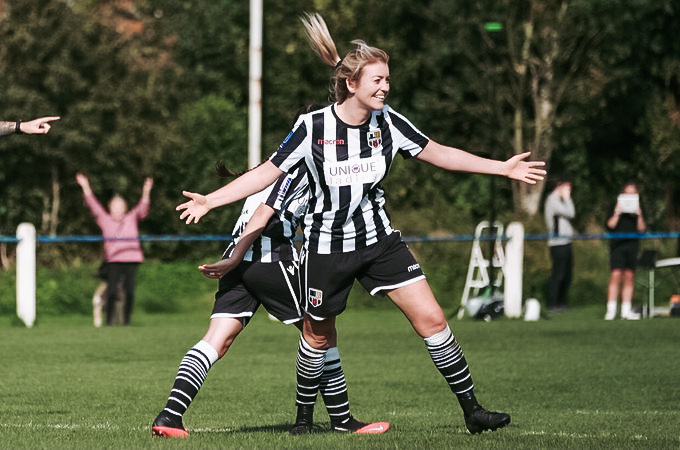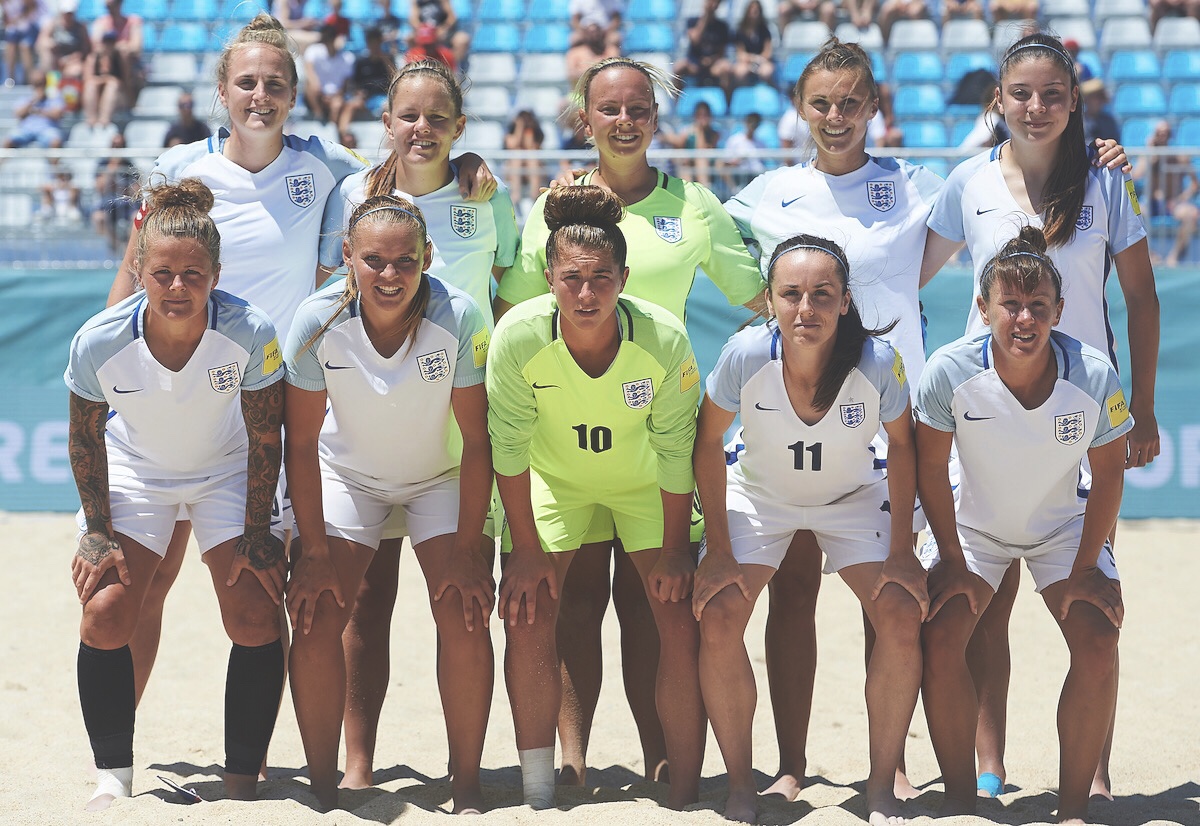Impetus editor Ben Gilby spoke to Chorley Women Chair Janet Mitchell about the Lancashire club whose forty-two-year history has their seen a victory over Manchester City and several promotions which has seen the side establish themselves in the fourth tier of the women’s game.
The excellent history of Chorley Women, compiled by Rod and Josie Prescott, reveals that the origins of the present day club can be traced as far back as 1978, when Mr. E. Gardner set up Cumberland Rangers Ladies, and although based around Preston, the club played their matches in Accrington, due to no local pitches being available to them. For season 1980-81, a pitch became available to the ladies in New Longton, so it made sense to re-name the club to New Longton Ladies, a name they would keep for three seasons. With most of the players coming from the Chorley Area, the club again changed its name for 1983-84 and became Chorley Ladies F.C.
Following an illustrious career, in which she had won every honour in the Women’s game, Sheila Parker was appointed team captain, and her husband became manager. Chorley-born Sheila had captained the very first England Women’s Team in November 1972, winning a total of 33 caps and is now rightly honoured in the National Football Museum Hall of Fame. After a reconstruction of the leagues, Chorley were placed in Division Two of the North-West Women’s Regional Football League. The club’s first ever game in the NWWRFL was against Manchester City Women on Sunday September 3rd 1989, in what was City’s first ever league game, Chorley ran riot winning 11-0, with goals from Michelle Bebbinton (3) Anne Stockdale (2) Sharon Schofield (2) Rosie Nolan (2) Mandy Mercer (1) and a Debbie Kirkman penalty. Chorley now find themselves playing in the F.A. Women’s National League Northern Division One – the fourth tier of the game.
Present chairperson Janet Mitchell reviewed these impressive achievements by emphasising “It’s important to mention that the club has gone from strength to strength over the past decade and no one would have believed a club this size would ever reach the fourth tier of women’s football. The club has defied the odds for years and we are very proud of that.”
Mitchell identifies several factors in the continuation of the club and their successes: “We have a sound structure and good financial management. The ability to attract good players and management is due to the hard work of the committee, who are all volunteers. We are also very lucky to have a small but very loyal fan base. The genetics of Chorley FC Women is different to most other clubs at this level, it remains family orientated and it remains a club that cares about the people who are involved in it from the players to the volunteers and the supporters; it has always been and still is a collective effort.”
Along with all clubs over the past seven months or so, it’s been a tough time for Chorley Women since the lockdown period began: “Honestly it’s been very difficult,” said Mitchell. The committee really been stretched keeping up with the demands placed upon us by ever changing guidance. Along with that, the first team have had a management change within the lockdown period & the new management team have worked hard to do everything they can to prepare the players. One of the biggest issues for us is facility hire as some facilities in the area are still not open. We managed to successfully allow supporters back in during pre-season but weren’t allowed to have them as the season started due to stricter ‘intervention rules’ in the area, this consequently means we don’t make any money on the gate and is a growing concern for the club going forward.”
At the present time, after a season and a half being amalgamated with the men’s side, the women’s side became independent once more, as the club chairwoman explained: “Chorley Women FC had always run independently from the men’s club since it was founded in. In the summer of the 2019/20 we amalgamated with the men’s club. Unfortunately, there was a complete relationship breakdown with the Directors last winter & now the clubs are run independently again. We do have a good relationship with the Chorley Supporters Club and a lot of the volunteers at the men’s club.”
A positive relationship for the club is the one they have established with Euxton Villa and Euxton Girls which helps to establish a pathway from girl’s to women’s football in addition to Chorley’s own three women’s teams, two open age women’s teams and an U18 side. Vital, as Mitchell believes “We firmly believe that the future of the club relies on it’s strength to develop it’s younger players.”
Other than the consequences of the coronavirus outbreak, Chorley face slightly different challenges to the vast majority of other level four clubs, as Janet outlines: “The main challenge for the club is competing financially in the FA Women’s National League. We have always been self-funded, relying on sponsorship, players paying subs and several fundraisers held over the season in order to sustain the club financially. We are aware that at this level many clubs are not charging subs and increasingly we are made aware that clubs at this level are paying their players. This is not an option for us as we could not sustain the cost. A consequence of this is that players often go elsewhere. Having said that, we are lucky to have a small number of very loyal players.”
We then focussed on the new season in the FAWNL Division One North, and I asked Janet her opinions on the quality of the league and Chorley’s aims: “I believe it’s one of the most competitive divisions around, there are a couple of teams who seem to have brought in a lot of new players this season so I am sure they will be expected to succeed. Our focus this season is to sustain and strengthen, we’ve brought younger players up to play first team football so that we have the right mix of youth and experience.”
Despite last year’s Women’s World Cup raising the profile of the sport, the impact was not immediately felt at Chorley. “In terms of interest at our level it hasn’t really filtered through,” Mitchell observed. “Sponsorship has always been difficult at this level; we tend to rely on people and businesses that are linked to the current players or whom have been with us for a while and we have built a relationship with. Our main sponsors Unique Ladies, Windoworld & Howard’s Financial have been with the club for years and we are indebted to them.
Like all too many clubs, Chorley rely on a vast number of volunteers putting in countless hours to keep the club going. The club chairwoman identified some of the great work being done by the unpaid group at her own club: “There are honestly too many to mention but from a hands-on committee point of view there is Geoff Dawson who was our Secretary for ten years and now our treasurer. Shaun Harrison is our current Secretary – without the two of them the club would simply not function. We are also extremely lucky to have the Prescott Family (who have followed Chorley since the very beginning) and who kindly provide all the club statistics, history and honours. There is literally nothing they don’t know about the club (and women’s football in general!) Last but not least we have Momma D -she’s our ball girl on training nights & provides our Haribo on match days!”
Our interview finished by looking ahead to the future of the women’s game in general and at Chorley in particular. Janet Mitchell sees positives and negatives ahead: “I see Women’s football in general going from strength to strength as the game is growing at speed which, as a retired female footballer who had very limited opportunities whilst growing up is amazing to see. However, I do worry that teams like our own will struggle to compete once money is allowed to creep into the game at this level which it undoubtedly is. You only have to look back over the last few seasons to see that smaller self-funded self-financed clubs at our level have struggled. That’s why we have put so much faith in younger players at the club and are looking to build from within but it won’t be easy for us. I have seen the game change so much over the past fourteen years mostly for the better but I fear that the women’s game as I know it will be ruined by greed, similar to the men’s at the top level.”









